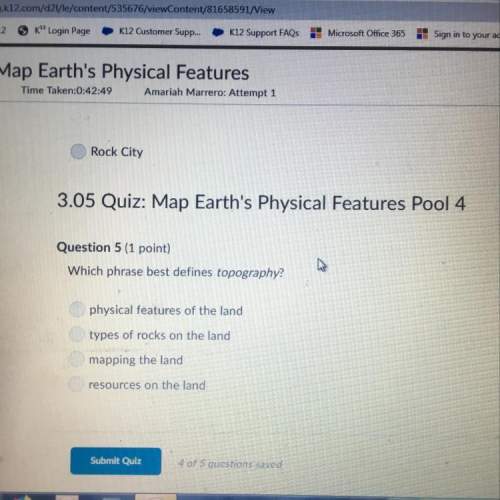
Chemistry, 16.03.2020 17:58 yasdallasj
When water is heated, bubbles form in the water. Is this evidence of a chemical reaction? Why? Question 2 options: No, boiling water is a physical change. Yes, the formation of a gas is evidence of a chemical reaction. No, the formation of gas bubbles is a secondary chemical reaction which is ignored. Yes, the formation of a gas is proof a new compound has been made. none of the above

Answers: 2
Another question on Chemistry

Chemistry, 22.06.2019 08:40
What is the value of keq for the reaction expressed in scientific notation?
Answers: 1

Chemistry, 22.06.2019 15:30
Plz me ! 1 which of earths spheres contains most of its mass? a atmosphere b hydrosphere c geosphere* d biosphere 2 erosion and weathering are examples of which types of forces? a constructive forces b destructive forces* c gravitational forces d inertia-related forces 3 which of the following statements about earths atmosphere is true? a earths atmosphere contains 78% water vapor which is essentail to life b earths atmosphere contains 21% oxygen c earths atmosphere contains carbon dioxide which all life forms require d earths atmosphere allows radiation from the sun to pass through it and warm earths surface* 4 the strenght of the force of gravity between two objects is determined by which of the following factors? select all that apply a the messes of the objects* b the distance between the objects* c the volumes of the objects d the surface area of the objects 5 earth and moon are kept in there respective orbits due to the influence of a inertia b gravity c gravity and inertia* d neither gravity or inertia if you answer all questions right i will give
Answers: 1

Chemistry, 22.06.2019 16:30
At 20°c, a sample of h2o liquid and a sample of co2 gas each have the same average kinetic energy. why is one a liquid and the other a gas at this temperature?
Answers: 1

Chemistry, 22.06.2019 16:50
Which of the following is an indication that a substance has undergone a chemical change? a. no new product has been formed. b. the color of the substance has not changed. c. the original constitute has not changed. d. the molecular structure has changed.
Answers: 1
You know the right answer?
When water is heated, bubbles form in the water. Is this evidence of a chemical reaction? Why? Quest...
Questions



Mathematics, 24.02.2021 06:40

Mathematics, 24.02.2021 06:40


Mathematics, 24.02.2021 06:40


Chemistry, 24.02.2021 06:40

Spanish, 24.02.2021 06:40





Chemistry, 24.02.2021 06:40

Arts, 24.02.2021 06:40




Mathematics, 24.02.2021 06:40




